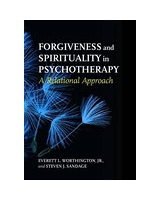“Forgiveness and Spirituality in Psychotherapy: A Relational Approach”

“Forgiveness and Spirituality in Psychotherapy: A Relational Approach”
By Everett L. Worthington, Jr. and Steven J. Sandage
American Psychological Association
Washington, D.C., 2016
Book offers useful theory, research information
Reviewed by Kerry Morrison, Psy.D.
Transgressions, losses, grief and trauma are fundamental issues in psychotherapy. Religious and spiritual beliefs are often challenged when significant life events occur. These beliefs or the lack of them, are often what clients wrestle with in order to make sense of their experiences.
Spirituality and religion can either facilitate or impede forgiveness. Positive or negative factors of faith-based beliefs are associated with forgiveness. Many people in crisis situations are often angry at their “God” or question their faith.
As a practitioner, I have found that some of the most meaningful therapeutic conversions and successful outcomes include discussion of these topics, as religious and spiritual beliefs often shape core beliefs.
Surveys have found that most psychotherapists are less religious than the general public. The topics of religion and spirituality are often avoided by therapists and are not addressed in many clinical training programs.
However, as Worthington & Sandage persuasively assert in their new publication, “Forgiveness & Spirituality in Psychotherapy,” these topics can be a doorway to the client’s personal existential world that would not have been possible had the therapist not allowed it to be part of the clinical conversation.
This book is a useful resource for students, early career therapists and seasoned practitioners as it highlights relevant theory and research with case examples from both brief and long-term psychotherapy for individuals, couples and groups.
The overview of the research on forgiveness done in the late 1990’s and the more recent research on forgiveness and spirituality provides a good framework and historical marker.
The authors’ emphasis on the relationship between therapist and client as the crucible that can serve to facilitate spiritual transformation to help clients forgive solidifies its usefulness to practitioners. They call their relational approach, Relational Spirituality.
The concept of forgiveness is emphasized as it is often at the center of the tensions surrounding these existential events and is believed to be what is needed in repairing conflicts and transgressions.
The authors’ present the REACH model of forgiveness, an acronym which emphasizes Recall, Emotional reprocessing, Altruistic giving of the gift of forgiveness, Commitment and Holding on to the forgiveness when doubts occurs.
Although I found this book interesting to read and clinically relevant, I thought it contained too much theory and I wanted more tools for clinical application, such as suggested questions to ask in the initial assessment/engagement phase, to set the tone of therapeutic exploration and deeper questions to explore about religion, spirituality and forgiveness in the heart of the treatment.
Nevertheless, I think that this is a useful read for time-strapped practitioners who want to understand this approach and improve their clinical efficacy by integrating the religious and psycho-spiritual approach into their work, as I believe that this is a key aspect of therapy that is missing.
Kerry Morrison, Psy.D. is a licensed psychologist in private practice in Greenfield, Mass.
Learn more about the book: Forgiveness and Spirituality in Psychotherapy: A Relational Approach
